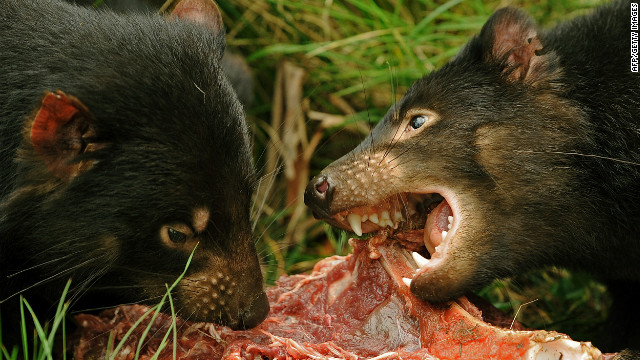The population of Tasmanian Devils has declined by over 60% since the mid-1990s.
STORY HIGHLIGHTS
- Cancer spread through biting is threatening wild population of Tasmanian Devils
- New study found most aggressive were most likely to contract disease
- Currently no treatment for Devil Facial Tumor Disease (DFTD)
- Estimates of 60% decline of wild population since DFTD discovered
(CNN) -- Taking the devilish element out of one of Australia's most iconic but endangered animals could save it from extinction.
Evolving to be less aggressive could be the best hope for saving Tasmanian Devils in the wild, suggest scientists from the University of Tasmania, in a new study.
The species is facing extinction from Devil Facial Tumor Disease (DFTD), an infectious cancer that is spread by the animals biting each other. It is believed that the cancer has wiped out over 60% of the animals since it was first discovered in 1996.
While the animals are solitary they are social and meet regularly either during mating, establishing social hierarchies, or when feeding around carcasses. On all occasions they bite each other.
We found the more aggressive devils, rather than being super-spreaders are super-receivers of the cancer. Rodrigo Hamede, University of Tasmania
However, the recent study led by Rodrigo Hamede, published in the British Ecological Society's Journal of Animal Ecology, led to the surprising discovery that the less a Tasmanian Devil gets bitten the more likely it is to become infected with the cancer.
"Our results --- that devils with fewer bites are more likely to develop DFTD --- were very surprising and counter-intuitive," he said.
"In most infectious diseases there are so-called super-spreaders, a few individuals responsible for most of the transmission. But we found the more aggressive devils, rather than being super-spreaders are super-receivers."
Over a period of four years, Hamede and his research team studied the animal at two locations in Tasmania and discovered that most of the tumors found on Tasmanian Devils were located in their mouths.
"This means that more aggressive devils do not get bitten as often, but they bite the tumors of the less aggressive devils and become infected," explained Hamede.
There is currently no vaccine or treatment for DFTD and once infected Tasmanian Devils do not live much longer than six months.
One of the study sites -- West Pencil Pine in western Tasmania -- was less badly hit by the disease, leading Hamede to feel hopeful that further research there could aid the survival of the species.
"Firstly, we need to explore the genetic differences that might be lessening the impact of DFTD in the West Pencil Pine devil population," said Hamede.
"Second, we need more detailed data on devil behavior to define 'shy' or 'bold' types. We could then use this information to develop a management strategy to reduce the spread of the disease by boosting natural selection of less aggressive, and therefore more resilient, devils."

No comments:
Post a Comment